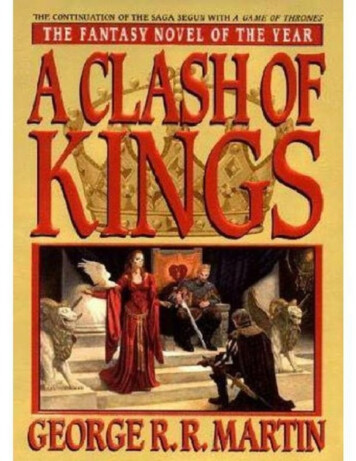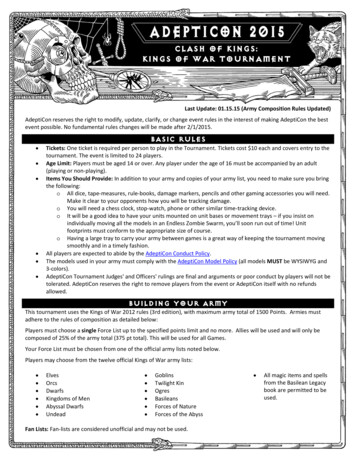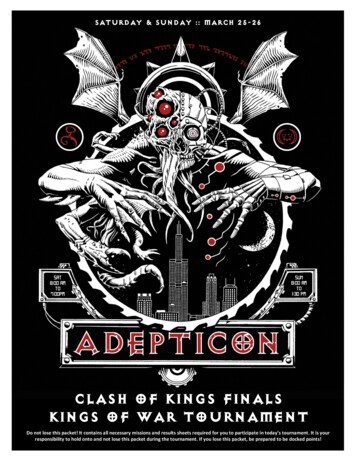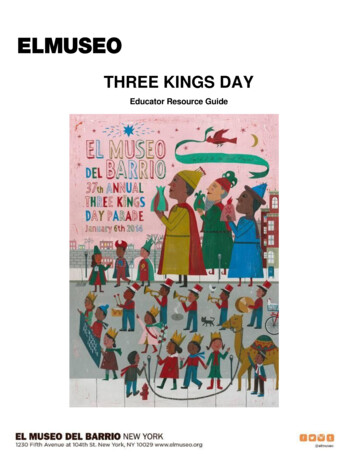
Transcription
A CLASH OF K INGSA Song of Ice and FireBook IIGeorge R.R. Martin
CONT ENTMap of the NorthMap of the SouthMap of King's sBranTyrionAryaCatelynSansa
ix: The Kings and Their Courts
The King On The Iron ThroneThe King In The Narrow SeaThe King In HighgardenThe King In The NorthThe Queen Across The WaterOther Houses Great and SmallHouse ArrynHouse FlorentHouse FreyHouse GreyjoyHouse LannisterHouse MartellHouse TyrellThe Men of The Night's Watch
to John and Gailfor all the meat and mead we've shared
PROLOGUEThe comet’s tail spread across the dawn, a red slash that bled above the crags of Dragonstone like awound in the pink and purple sky.The maester stood on the windswept balcony outside his chambers. It was here the ravens came,after long flight. Their droppings speckled the gargoyles that rose twelve feet tall on either side ofhim, a hellhound and a wyvern, two of the thousand that brooded over the walls of the ancientfortress. When first he came to Dragonstone, the army of stone grotesques had made him uneasy, butas the years passed he had grown used to them. Now he thought of them as old friends. The three ofthem watched the sky together with foreboding.The maester did not believe in omens. And yet old as he was, Cressen had never seen a comethalf so bright, nor yet that color, that terrible color, the color of blood and flame and sunsets. Hewondered if his gargoyles had ever seen its like. They had been here so much longer than he had, andwould still be here long after he was gone. If stone tongues could speak Such folly. He leaned against the battlement, the sea crashing beneath him, the black stone roughbeneath his fingers. Talking gargoyles and prophecies in the sky. I am an old done man, grown giddy asa child again. Had a lifetime’s hard-won wisdom fled him along with his health and strength? He wasa maester, trained and chained in the great Citadel of Oldtown. What had he come to, whensuperstition filled his head as if he were an ignorant fieldhand?And yet and yet the comet burned even by day now, while pale grey steam rose from the hotvents of Dragonmont behind the castle, and yestermorn a white raven had brought word from theCitadel itself, word long-expected but no less fearful for all that, word of summer ’s end. Omens, all.Too many to deny. What does it all mean? he wanted to cry.“Maester Cressen, we have visitors.” Pylos spoke softly, as if loath to disturb Cressen’s solemnmeditations. Had he known what drivel filled his head, he would have shouted. “The princess wouldsee the white raven.” Ever correct, Pylos called her princess now, as her lord father was a king. Kingof a smoking rock in the great salt sea, yet a king nonetheless. “Her fool is with her.”The old man turned away from the dawn, keeping a hand on his wyvern to steady himself. “Helpme to my chair and show them in.”Taking his arm, Pylos led him inside. In his youth, Cressen had walked briskly, but he was not farfrom his eightieth name day now, and his legs were frail and unsteady. Two years past, he had fallenand shattered a hip, and it had never mended properly. Last year when he took ill, the Citadel had sentPylos out from Oldtown, mere days before Lord Stannis had closed the isle to help him in hislabors, it was said, but Cressen knew the truth. Pylos had come to replace him when he died. He didnot mind. Someone must take his place, and sooner than he would like He let the younger man settle him behind his books and papers. “Go bring her. It is ill to keep alady waiting.” He waved a hand, a feeble gesture of haste from a man no longer capable of hastening.His flesh was wrinkled and spotted, the skin so papery thin that he could see the web of veins and theshape of bones beneath. And how they trembled, these hands of his that had once been so sure anddeft When Pylos returned the girl came with him, shy as ever. Behind her, shuffling and hopping inthat queer sideways walk of his, came her fool. On his head was a mock helm fashioned from an oldtin bucket, with a rack of deer antlers strapped to the crown and hung with cowbells. With his everylurching step, the bells rang, each with a different voice, clang-a-dang bong-dong ring-a-ling clong
clong clong.“Who comes to see us so early, Pylos?” Cressen said.“It’s me and Patches, Maester.” Guileless blue eyes blinked at him. Hers was not a pretty face,alas. The child had her lord father ’s square jut of jaw and her mother ’s unfortunate ears, along with adisfigurement all her own, the legacy of the bout of greyscale that had almost claimed her in the crib.Across half one cheek and well down her neck, her flesh was stiff and dead, the skin cracked andflaking, mottled black and grey and stony to the touch. “Pylos said we might see the white raven.”“Indeed you may,” Cressen answered. As if he would ever deny her. She had been denied toooften in her time. Her name was Shireen. She would be ten on her next name day, and she was thesaddest child that Maester Cressen had ever known. Her sadness is my shame, the old man thought,another mark of my failure. “Maester Pylos, do me a kindness and bring the bird down from therookery for the Lady Shireen.”“It would be my pleasure.” Pylos was a polite youth, no more than five-and-twenty, yet solemn asa man of sixty. If only he had more humor, more life in him; that was what was needed here. Grimplaces needed lightening, not solemnity, and Dragonstone was grim beyond a doubt, a lonely citadelin the wet waste surrounded by storm and salt, with the smoking shadow of the mountain at its back. Amaester must go where he is sent, so Cressen had come here with his lord some twelve years past, andhe had served, and served well. Yet he had never loved Dragonstone, nor ever felt truly at home here.Of late, when he woke from restless dreams in which the red woman figured disturbingly, he oftendid not know where he was.The fool turned his patched and piebald head to watch Pylos climb the steep iron steps to therookery. His bells rang with the motion. “Under the sea, the birds have scales for feathers,” he said,clang-a-langing. “I know, I know, oh, oh, oh.”Even for a fool, Patchface was a sorry thing. Perhaps once he could evoke gales of laughter witha quip, but the sea had taken that power from him, along with half his wits and all his memory. He wassoft and obese, subject to twitches and trembles, incoherent as often as not. The girl was the only onewho laughed at him now, the only one who cared if he lived or died.An ugly little girl and a sad fool, and maester makes three now there is a tale to make menweep. “Sit with me, child.” Cressen beckoned her closer. “This is early to come calling, scarce pastdawn. You should be snug in your bed.”“I had bad dreams,” Shireen told him. “About the dragons. They were coming to eat me.”The child had been plagued by nightmares as far back as Maester Cressen could recall. “We havetalked of this before,” he said gently. “The dragons cannot come to life. They are carved of stone,child. In olden days, our island was the westernmost outpost of the great Freehold of Valyria. It wasthe Valyrians who raised this citadel, and they had ways of shaping stone since lost to us. A castle musthave towers wherever two walls meet at an angle, for defense. The Valyrians fashioned these towersin the shape of dragons to make their fortress seem more fearsome, just as they crowned their wallswith a thousand gargoyles instead of simple crenellations.” He took her small pink hand in his ownfrail spotted one and gave it a gentle squeeze. “So you see, there is nothing to fear. “Shireen was unconvinced. “What about the thing in the sky? Dalla and Matrice were talking bythe well, and Dalla said she heard the red woman tell Mother that it was dragonsbreath. If the dragonsare breathing, doesn’t that mean they are coming to life?”The red woman, Maester Cressen thought sourly. Ill enough that she’s filled the head of themother with her madness, must she poison the daughter’s dreams as well? He would have a stern word
with Dalla, warn her not to spread such tales. “The thing in the sky is a comet, sweet child. A star witha tail, lost in the heavens. It will be gone soon enough, never to be seen again in our lifetimes. Watchand see.”Shireen gave a brave little nod. “Mother said the white raven means it’s not summer anymore.”“That is so, my lady. The white ravens fly only from the Citadel.” Cressen’s fingers went to thechain about his neck, each link forged from a different metal, each symbolizing his mastery ofanother branch of learning; the maester ’s collar, mark of his order. In the pride of his youth, he hadworn it easily, but now it seemed heavy to him, the metal cold against his skin. “They are larger thanother ravens, and more clever, bred to carry only the most important messages. This one came to tellus that the Conclave has met, considered the reports and measurements made by maesters all over therealm, and declared this great summer done at last. Ten years, two turns, and sixteen days it lasted, thelongest summer in living memory.”“Will it get cold now?” Shireen was a summer child, and had never known true cold.“In time,” Cressen replied. “If the gods are good, they will grant us a warm autumn and bountifulharvests, so we might prepare for the winter to come.” The smallfolk said that a long summer meantan even longer winter, but the maester saw no reason to frighten the child with such tales.Patchface rang his bells. “It is always summer under the sea,” he intoned. “The merwives wearnennymoans in their hair and weave gowns of silver seaweed. I know, I know, oh, oh, oh.”Shireen giggled. “I should like a gown of silver seaweed.”“Under the sea, it snows up,” said the fool, “and the rain is dry as bone. I know, I know, oh, oh,oh.”“Will it truly snow?” the child asked.“It will,” Cressen said. But not for years yet, I pray, and then not for long. “Ah, here is Pylos withthe bird.”Shireen gave a cry of delight. Even Cressen had to admit the bird made an impressive sight,white as snow and larger than any hawk, with the bright black eyes that meant it was no mere albino,but a truebred white raven of the Citadel. “Here,” he called. The raven spread its wings, leapt into theair, and flapped noisily across the room to land on the table beside him.“I’ll see to your breakfast now,” Pylos announced. Cressen nodded. “This is the Lady Shireen,”he told the raven. The bird bobbed its pale head up and down, as if it were bowing. “Lady,” it croaked.“Lady.”The child’s mouth gaped open. “It talks!”“A few words. As I said, they are clever, these birds.”“Clever bird, clever man, clever clever fool,” said Patchface, jangling. “Oh, clever clever cleverfool.” He began to sing. “The shadows come to dance, my lord, dance my lord, dance my lord,” hesang, hopping from one foot to the other and back again. “The shadows come to stay, my lord, stay mylord, stay my lord.” He jerked his head with each word, the bells in his antlers sending up a clangor.The white raven screamed and went flapping away to perch on the iron railing of the rookerystairs. Shireen seemed to grow smaller. “He sings that all the time. I told him to stop but he won’t. Itmakes me scared. Make him stop.”And how do I do that? the old man wondered. Once I might have silenced him forever, but now Patchface had come to them as a boy. Lord Steffon of cherished memory had found him inVolantis, across the narrow sea. The king—the old king, Aerys II Targaryen, who had not been quite
so mad in those days—had sent his lordship to seek a bride for Prince Rhaegar, who had no sisters towed. “We have found the most splendid fool,” he wrote Cressen, a fortnight before he was to returnhome from his fruitless mission. “Only a boy, yet nimble as a monkey and witty as a dozen courtiers.He juggles and riddles and does magic, and he can sing prettily in four tongues. We have bought hisfreedom and hope to bring him home with us. Robert will be delighted with him, and perhaps in timehe will even teach Stannis how to laugh.”It saddened Cressen to remember that letter. No one had ever taught Stannis how to laugh, leastof all the boy Patchface. The storm came up suddenly, howling, and Shipbreaker Bay proved the truthof its name. The lord’s two-masted galley Windproud broke up within sight of his castle. From itsparapets his two eldest sons had watched as their father ’s ship was smashed against the rocks andswallowed by the waters. A hundred oarsmen and sailors went down with Lord Steffon Baratheon andhis lady wife, and for days thereafter every tide left a fresh crop of swollen corpses on the strandbelow Storm’s End.The boy washed up on the third day. Maester Cressen had come down with the rest, to help putnames to the dead. When they found the fool he was naked, his skin white and wrinkled and powderedwith wet sand. Cressen had thought him another corpse, but when Jommy grabbed his ankles to draghim off to the burial wagon, the boy coughed water and sat up. To his dying day, Jommy had swornthat Patchface’s flesh was clammy cold.No one ever explained those two days the fool had been lost in the sea. The fisherfolk liked tosay a mermaid had taught him to breathe water in return for his seed. Patchface himself had saidnothing. The witty, clever lad that Lord Steffon had written of never reached Storm’s End; the boythey found was someone else, broken in body and mind, hardly capable of speech, much less of wit.Yet his fool’s face left no doubt of who he was. It was the fashion in the Free City of Volantis to tattoothe faces of slaves and servants; from neck to scalp the boy’s skin had been patterned in squares ofred and green motley.“The wretch is mad, and in pain, and no use to anyone, least of all himself,” declared old SerHarbert, the castellan of Storm’s End in those years. “The kindest thing you could do for that one isfill his cup with the milk of the poppy. A painless sleep, and there’s an end to it. He’d bless you if hehad the wit for it.” But Cressen had refused, and in the end he had won. Whether Patchface had gottenany joy of that victory he could not say, not even today, so many years later.“The shadows come to dance, my lord, dance my lord, dance my lord,” the fool sang on, swinginghis head and making his bells clang and clatter. Bong dong, ring-a-ling, bong dong.“Lord,” the white raven shrieked. “Lord, lord, lord.”“A fool sings what he will,” the maester told his anxious princess. “You must not take his wordsto heart. On the morrow he may remember another song, and this one will never be heard again.” Hecan sing prettily in four tongues, Lord Steffon had written Pylos strode through the door. “Maester, pardons.”“You have forgotten the porridge,” Cressen said, amused. That was most unlike Pylos.“Maester, Ser Davos returned last night. They were talking of it in the kitchen. I thought youwould want to know at once.”“Davos last night, you say? Where is he?”“With the king. They have been together most of the night.”There was a time when Lord Stannis would have woken him, no matter the hour, to have himthere to give his counsel. “I should have been told,” Cressen complained. “I should have been woken.”
He disentangled his fingers from Shireen’s. “Pardons, my lady, but I must speak with your lord father.Pylos, give me your arm. There are too many steps in this castle, and it seems to me they add a fewevery night, just to vex me.”Shireen and Patchface followed them out, but the child soon grew restless with the old man’screeping pace and dashed ahead, the fool lurching after her with his cowbells clanging madly.Castles are not friendly places for the frail, Cressen was reminded as he descended the turnpikestairs of Sea Dragon Tower. Lord Stannis would be found in the Chamber of the Painted Table, atopthe Stone Drum, Dragonstone’s central keep, so named for the way its ancient walls boomed andrumbled during storms. To reach him they must cross the gallery, pass through the middle and innerwalls with their guardian gargoyles and black iron gates, and ascend more steps than Cressen cared tocontemplate. Young men climbed steps two at a time; for old men with bad hips, every one was atorment. But Lord Stannis would not think to come to him, so the maester resigned himself to theordeal. He had Pylos to help him, at the least, and for that he was grateful.Shuffling along the gallery, they passed before a row of tall arched windows with commandingviews of the outer bailey, the curtain wall, and the fishing village beyond. In the yard, archers werefiring at practice butts to the call of “Notch, draw, loose.” Their arrows made a sound like a flock ofbirds taking wing. Guardsmen strode the wallwalks, peering between the gargoyles on the hostcamped without. The morning air was hazy with the smoke of cookfires, as three thousand men satdown to break their fasts beneath the banners of their lords. Past the sprawl of the camp, theanchorage was crowded with ships. No craft that had come within sight of Dragonstone this past halfyear had been allowed to leave again. Lord Stannis’s Fury, a triple-decked war galley of threehundred oars, looked almost small beside some of the big-bellied carracks and cogs that surroundedher.The guardsmen outside the Stone Drum knew the maesters by sight, and passed them through.“Wait here,” Cressen told Pylos, within. “It’s best I see him alone.”“It is a long climb, Maester.”Cressen smiled. “You think I have forgotten? I have climbed these steps so often I know each oneby name.”Halfway up, he regretted his decision. He had stopped to catch his breath and ease the pain in hiship when he heard the scuff of boots on stone, and came face-to-face with Ser Davos Seaworth,descending.Davos was a slight man, his low birth written plain upon a common face. A well-worn greencloak, stained by salt and spray and faded from the sun, draped his thin shoulders, over brown doubletand breeches that matched brown eyes and hair. About his neck a pouch of worn leather hung from athong. His small beard was well peppered with grey, and he wore a leather glove on his maimed lefthand. When he saw Cressen, he checked his descent.“Ser Davos,” the maester said. “When did you return?”“In the black of morning. My favorite time.” It was said that no one had ever handled a ship bynight half so well as Davos Shorthand. Before Lord Stannis had knighted him, he had been the mostnotorious and elusive smuggler in all the Seven Kingdoms.“And?”The man shook his head. “It is as you warned him. They will not rise, Maester. Not for him. Theydo not love him.”No, Cressen thought. Nor will they ever. He is strong, able, just aye, just past the point of
wisdom yet it is not enough. It has never been enough. “You spoke to them all?”“All? No. Only those that would see me. They do not love me either, these highborns. To themI’ll always be the Onion Knight.” His left hand closed, stubby fingers locking into a fist; Stannis hadhacked the ends off at the last joint, all but the thumb. “I broke bread with Gulian Swann and oldPenrose, and the Tarths consented to a midnight meeting in a grove. The others—well, BericDondarrion is gone missing, some say dead, and Lord Caron is with Renly. Bryce the Orange, of theRainbow Guard.”“The Rainbow Guard?”“Renly’s made his own Kingsguard,” the onetime smuggler explained, “but these seven don’twear white. Each one has his own color. Loras Tyrell’s their Lord Commander.”It was just the sort of notion that would appeal to Renly Baratheon; a splendid new order ofknighthood, with gorgeous new raiment to proclaim it. Even as a boy, Renly had loved bright colorsand rich fabrics, and he had loved his games as well. “Look at me!” he would shout as he ranlaughing through the halls of Storm’s End. “Look at me, I’m a dragon,” or “Look at me, I’m awizard,” or “Look at me, look at me, I’m the rain god.”The bold little boy with wild black hair and laughing eyes was a man grown now, one-andtwenty, and still he played his games. Look at me, I’m a king, Cressen thought sadly. Oh, Renly, Renly,dear sweet child, do you know what you are doing? And would you care if you did? Is there anyonewho cares for him but me? “What reasons did the lords give for their refusals?” he asked Ser Davos.“Well, as to that, some gave me soft words and some blunt, some made excuses, some promises,some only lied.” He shrugged. “In the end words are just wind.”“You could bring him no hope?”“Only the false sort, and I’d not do that,” Davos said. “He had the truth from me.”Maester Cressen remembered the day Davos had been knighted, after the siege of Storm’s End.Lord Stannis and a small garrison had held the castle for close to a year, against the great host of theLords Tyrell and Redwyne. Even the sea was closed against them, watched day and night by Redwynegalleys flying the burgundy banners of the Arbor. Within Storm’s End, the horses had long since beeneaten, the dogs and cats were gone, and the garrison was down to roots and rats. Then came a nightwhen the moon was new and black clouds hid the stars. Cloaked in that darkness, Davos the smugglerhad dared the Redwyne cordon and the rocks of Shipbreaker Bay alike. His little ship had a black hull,black sails, black oars, and a hold crammed with onions and salt fish. Little enough, yet it had kept thegarrison alive long enough for Eddard Stark to reach Storm’s End and break the siege.Lord Stannis had rewarded Davos with choice lands on Cape Wrath, a small keep, and a knight’shonors but he had also decreed that he lose a joint of each finger on his left hand, to pay for all hisyears of smuggling. Davos had submitted, on the condition that Stannis wield the knife himself; hewould accept no punishment from lesser hands. The lord had used a butcher ’s cleaver, the better to cutclean and true. Afterward, Davos had chosen the name Seaworth for his new-made house, and he tookfor his banner a black ship on a pale grey field—with an onion on its sails. The onetime smugglerwas fond of saying that Lord Stannis had done him a boon, by giving him four less fingernails toclean and trim.No, Cressen thought, a man like that would give no false hope, nor soften a hard truth. “SerDavos, truth can be a bitter draught, even for a man like Lord Stannis. He thinks only of returning toKing’s Landing in the fullness of his power, to tear down his enemies and claim what is rightfully his.Yet now ”
“If he takes this meager host to King’s Landing, it will be only to die. He does not have thenumbers. I told him as much, but you know his pride.” Davos held up his gloved hand. “My fingerswill grow back before that man bends to sense.”The old man sighed. “You have done all you could. Now I must add my voice to yours.” Wearily,he resumed his climb.Lord Stannis Baratheon’s refuge was a great round room with walls of bare black stone and fourtall narrow windows that looked out to the four points of the compass. In the center of the chamberwas the great table from which it took its name, a massive slab of carved wood fashioned at thecommand of Aegon Targaryen in the days before the Conquest. The Painted Table was more thanfifty feet long, perhaps half that wide at its widest point, but less than four feet across at its narrowest.Aegon’s carpenters had shaped it after the land of Westeros, sawing out each bay and peninsula untilthe table nowhere ran straight. On its surface, darkened by near three hundred years of varnish, werepainted the Seven Kingdoms as they had been in Aegon’s day; rivers and mountains, castles and cities,lakes and forests.There was a single chair in the room, carefully positioned in the precise place that Dragonstoneoccupied off the coast of Westeros, and raised up to give a good view of the tabletop. Seated in thechair was a man in a tight-laced leather jerkin and breeches of roughspun brown wool. When MaesterCressen entered, he glanced up. “I knew you would come, old man, whether I summoned you or no.”There was no hint of warmth in his voice; there seldom was.Stannis Baratheon, Lord of Dragonstone and by the grace of the gods rightful heir to the IronThrone of the Seven Kingdoms of Westeros, was broad of shoulder and sinewy of limb, with atightness to his face and flesh that spoke of leather cured in the sun until it was as tough as steel. Hardwas the word men used when they spoke of Stannis, and hard he was. Though he was not yet five-andthirty, only a fringe of thin black hair remained on his head, circling behind his ears like the shadowof a crown. His brother, the late King Robert, had grown a beard in his final years. Maester Cressenhad never seen it, but they said it was a wild thing, thick and flerce. As if in answer, Stannis kept hisown whiskers cropped tight and short. They lay like a blue-black shadow across his square jaw andthe bony hollows of his cheeks. His eyes were open wounds beneath his heavy brows, a blue as darkas the sea by night. His mouth would have given despair to even the drollest of fools; it was a mouthmade for frowns and scowls and sharply worded commands, all thin pale lips and clenched muscles, amouth that had forgotten how to smile and had never known how to laugh. Sometimes when the worldgrew very still and silent of a night, Maester Cressen fancied he could hear Lord Stannis grinding histeeth half a castle away.“Once you would have woken me,” the old man said.“Once you were young. Now you are old and sick, and need your sleep.” Stannis had neverlearned to soften his speech, to dissemble or flatter; he said what he thought, and those that did notlike it could be damned. “I knew you’d learn what Davos had to say soon enough. You always do,don’t you?”“I would be of no help to you if I did not,” Cressen said. “I met Davos on the stair.”“And he told all, I suppose? I should have had the man’s tongue shortened along with hisfingers.”“He would have made you a poor envoy then.”“He made me a poor envoy in any case. The storm lords will not rise for me. It seems they donot like me, and the justice of my cause means nothing to them. The cravenly ones will sit behind
their walls waiting to see how the wind rises and who is likely to triumph. The bold ones have alreadydeclared for Renly. For Renly!” He spat out the name like poison on his tongue.“Your brother has been the Lord of Storm’s End these past thirteen years. These lords are hissworn bannermen—”“His,” Stannis broke in, “when by rights they should be mine. I never asked for Dragonstone. Inever wanted it. I took it because Robert’s enemies were here and he commanded me to root them out.I built his fleet and did his work, dutiful as a younger brother should be to an elder, as Renly shouldbe to me. And what was Robert’s thanks? He names me Lord of Dragonstone, and gives Storm’s Endand its incomes to Renly. Storm’s End belonged to House Baratheon for three hundred years; byrights it should have passed to me when Robert took the Iron Throne.”It was an old grievance, deeply felt, and never more so than now. Here was the heart of his lord’sweakness; for Dragonstone, old and strong though it was, commanded the allegiance of only ahandful of lesser lords, whose stony island holdings were too thinly peopled to yield up the men thatStannis needed. Even with the sellswords he had brought across the narrow sea from the Free Citiesof Myr and Lys, the host camped outside his walls was far too small to bring down the power ofHouse Lannister.“Robert did you an injustice,” Maester Cressen replied carefully, “yet he had sound reasons.Dragonstone had long been the seat of House Targaryen. He needed a man’s strength to rule here, andRenly was but a child.”“He is a child still,” Stannis declared, his anger ringing loud in the empty hall, “a thieving childwho thinks to snatch the crown off my brow. What has Renly ever done to earn a throne? He sits incouncil and jests with Littlefinger, and at tourneys he dons his splendid suit of armor and allowshimself to be knocked off his horse by a better man. That is the sum of my brother Renly, who thinkshe ought to be a king. I ask you, why did the gods inflict me with brothers?”“I cannot answer for the gods.”“You seldom answer at all these days, it seems to me. Who maesters for Renly? Perchance Ishould send for him, I might like his counsel better. What do you think this maester said when mybrother decided to steal my crown? What counsel did your colleague offer to this traitor blood ofmine?”“It would surprise me if Lord Renly sought counsel, Your Grace.” The youngest of LordSteffon’s three sons had grown into a man bold but heedless, who acted from impulse rather thancalculation. In that, as in so much else, Renly was like his brother Robert, and utterly unlike Stannis.“Your Grace,” Stannis repeated bitterly. “You mock me with a king’s style, yet what am I king of?Dragonstone and a few rocks in the narrow sea, there is my kingdom.” He descended the steps of hischair to stand before the table, his shadow falling across the mouth of the Blackwater Rush and thepainted forest where King’s Landing now stood. There he stood, brooding over the realm he soughtto claim, so near at hand and yet so far away. “Tonight I am to sup with my lords bannermen, such asthey are. Celtigar, Velaryon, Bar Emmon, the whole paltry lot of them. A poor crop, if truth be told,but they are what my brothers have left me. That Lysene pirate Salladhor Saan will be there with thelatest tally of what I owe him, and Morosh the Myrman will caution me with talk of tides and autumngales, while Lord Sunglass mutters piously of the will of the Seven. Celtigar will want to know
Title: A Clash of Kings Author: George R. R. Martin Keywords: Fantasy Created Date: 9/24/2015 8:40:30 AM










